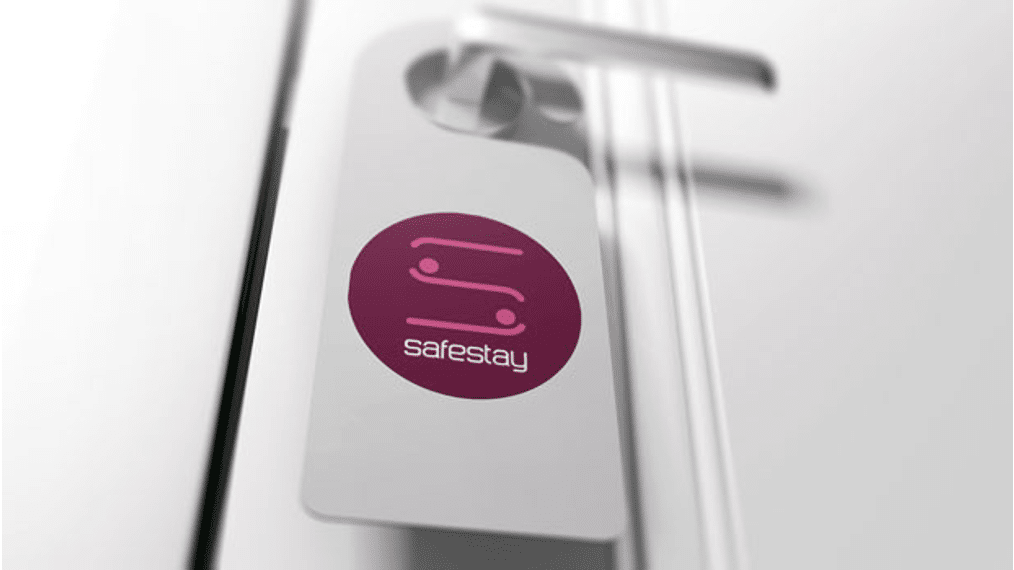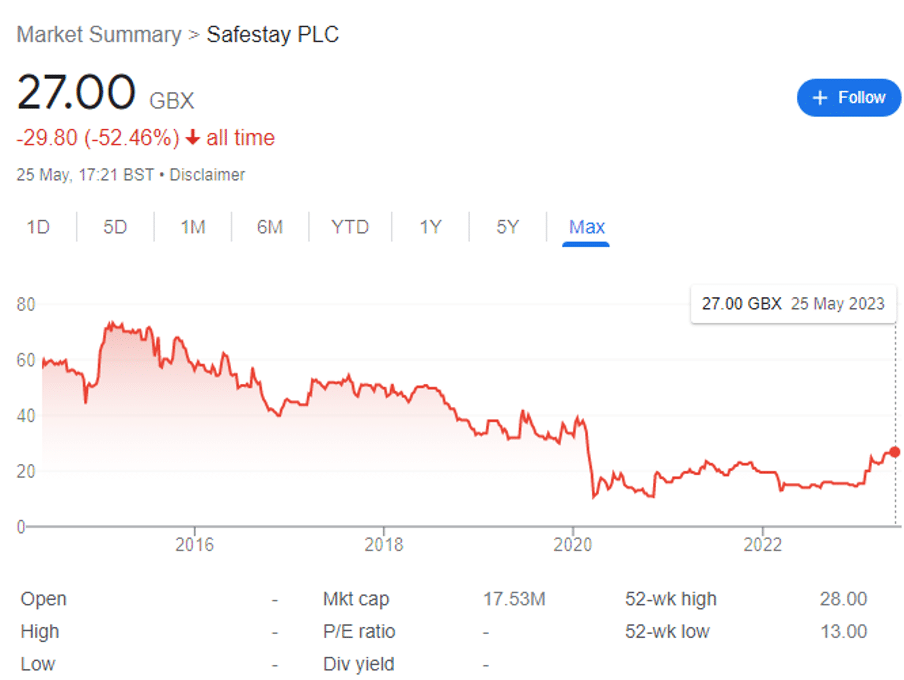Safestay was hit hard by the pandemic. The FTSE AIM premium hostel company’s rebound may just be getting started.

Safestay (LON: SSTY) shares are outside of my normal comfort zone, but I always keep an eye out for quality growth companies.
SSTY could well fit this description; shares are up 86% year-to-date after releasing bullish FY22 results. But at 27p, it remains down 52% since its 2014 IPO, 63% since its 2015 record high, and a full 10p from its pre-pandemic price point.

And at just £17.5 million, SSTY now looks simply undervalued purely on the fundamentals.
What does SSTY do?
Safestay aims to offer a new kind of hostel experience, providing high quality accommodation and superb value for money — alongside a safe environment and desirable communal areas. For context, a night in its new Pisa hostel will set you back less than 30 euros at the height of the summer holidays; similar hotel rooms cost hundreds more.

The two main concerns that travellers have when using hostels are safety and passably decent accommodation. As a younger man, I spent more than my fair share of time in hostels which offered neither — and Safestay is aiming to tap into this section of the ‘premium’ hostel market. For example, most hostels offer single-gender or mixed rooms, and the dorms are relatively decent for the money.
This is a growth industry and a highly cash generative business. Further, hostels fit into almost any building, unlike hotels which often need to be purpose built. Moreover, SSTY can also buy other hostels as it goes, transforming their fortunes with its brands to consolidate the industry.
With early mover advantage, SSTY has seen 57% CAGR since its 2014 IPO, and 25% growth in 2019 alone before the pandemic struck. It currently boasts 16 hostels across premium central locations in popular tourist-orientated European cities, with a total of 4,900 beds.
The AIM company is very selective of its hostels. All are city central, close to public transport options, and most are right in the middle of tourist areas. The team prides itself on having multilingual staff — and it provides free bed linen and secure locker storage.
Of course, hostels are not going to attract everybody, but paying slightly more for a central location and better amenities is a good strategy which is clearly working. In particular, group bookings of full rooms offer travellers (and let’s be honest, generally of the gap year variety) a cheap stay in a popular location with the safety of being surrounded by close friends.
Safestay FY22 results
On 28 February, Safestay announced strong FY22 results. The market reaction was immediate, with SSTY shares shooting up from 20p to 26p.
Announcing post-pandemic ‘normal business resuming,’ it saw revenues jump to £19 million, up from just £6.4 million during the trading-restricted prior year. For context, revenue was £14.6 million in 2018 and £18.3 million in 2019 — so with the pandemic now over amid serious pent-up demand, there’s a good chance that SSTY will return to its prior growth.
Or in other words, it remains far below its pre-pandemic share price point despite already bringing in more revenue.
Adjusted EBITDA is expected to be ‘in line with market expectations’ at £5.9 million, a sizeable swing from the £1 million loss of 2021. Its average bed rate — a key indicator — rose from £19.70 to £23.70 — while occupancy nearly doubled from 35% to 63%.
This leaves extra room (forgive the pun) for revenue growth in FY23, with the company arguing that overall ‘this marks the return to a near-normal premium hostel market with further upside anticipated.’ SSTY notes that the 20% uplift in its average bed rate ‘should be sustainable and if combined with a continued increase in occupancy, provides a firm platform for a strong performance through this year.’
As a caveat, I’d note that these results are currently unaudited.
Where next for Safestay?
The company’s hostels were closed for 3% of the year in FY22, leaving operational performance broadly uninterrupted but also offering an extra 11 days of potential revenue in FY23. It notes that the business improved strongly over the key summer season in 2022 — and summer 2023 is upon us, with thousands of graduates looking for their first holiday abroad in years.
The 63% occupancy rate remains ‘well below historic market levels with significant opportunity for continuing improvement.’ And the company also notes that a key segment, group bookings by schools and colleges, had not yet returned by 2022, but that ‘positive signs’ are emerging that they are in 2023.
Of course, Safestay was forced to scale back during the pandemic.
In March 2021, it sold off its smallest Barcelona property — a leasehold with 96 beds for book value of €900,000. This site was previously generating annual EBITDA of €70,000, but was a necessary strategic decision as the cash was used to repay €1.18 million to Equity Point Holding Empresarial for the 2018 purchase of another SSTY Barcelona hostel located in the avenue of Passeig de Gràcia, a much larger hostel with 351 beds.
It also sold its Edinburgh Hostel for £16 million, a 22% premium to the £13.4 million book value. The 2019 annual EBITDA of the hostel pre-COVID 19 was £1.7 million, so this was perhaps a more bitter pill to swallow — but the group had already reduced monthly cash burn to £350,000 and extended lockdowns meant that this was most ‘attractive solution’ available. Some of the cash was used to reduce its debt position by 35%.
It’s worth noting that it had several credible buyout offers at this time — but rejected them believing in the strength of the growth model.

Currently, SSTY has a ‘good position,’ with £4.8 million of cash as of the end of last year. Chairman Larry Lipman notes that ‘the pandemic enforced fundamental change on our business. It required we re-finance the Group and strip back the operational structure to a bare minimum.’
However, the Chair also enthuses that ‘as part of re-starting the business, we have been able to use our accumulated knowledge to build the business back up more efficiently and the Group is perhaps the stronger for it. Certainly, our performance in 2022 was pleasing and we are now focused on continuing the- growth in 2023.’
It’s worth noting that the company recently brought Sarah Whiddett on board as a Non-Executive Director. Whiddett is a Strategic Client Partner for Kantar, was previously Chair and Director of AURA, and held senior positions at Bidfood. These are some seriously impressive companies, and she would not have come on board without expecting serious growth.
So do I.
This article has been prepared for information purposes only by Charles Archer. It does not constitute advice, and no party accepts any liability for either accuracy or for investing decisions made using the information provided.
Further, it is not intended for distribution to, or use by, any person in any country or jurisdiction where such distribution or use would be contrary to local law or regulation.
